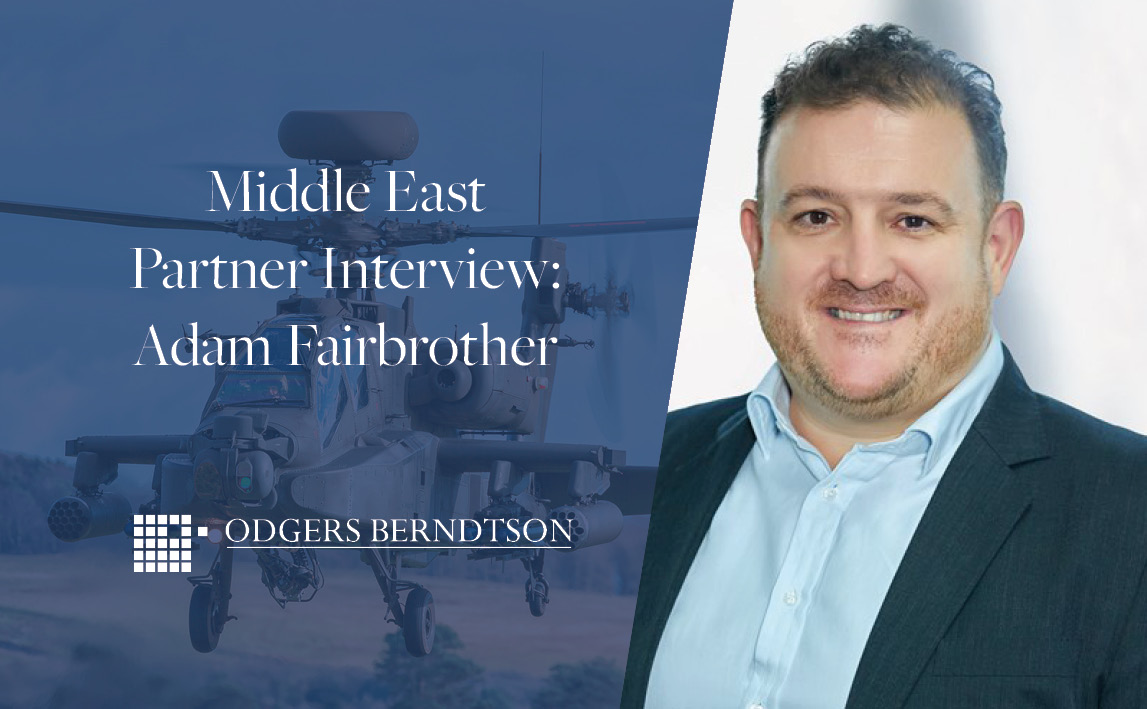We spoke with Adam Fairbrother, partner and head of the aerospace, defence, and security practice in MENA, about the major defence industry trends in the Middle East and what they mean for leadership acquisition in the region.
What are the major aerospace, defense, and security industry trends in the Middle East?
Adam: "The major trends today all center around localization and the creation of a nascent local industry across numerous countries in the region. This encompasses the building of both industry and a local supply chain.
This is being done through partnerships and alliances with Western multinationals and major players within aerospace, defense, and security. So it requires a long-term commitment from the businesses that want to invest in the region.
It is also important to note the Middle East industry is catering for both its local markets (for its military end-users, the armies, navies, etc.) and for the international market, to export products out of the region.
So why are they looking to localize? Of course, it is a question of pride and having local knowledge and skills within the country. But it is also to enable the modernization of their own systems, defense platforms, and aerospace, including civil aerospace. Countries here want to enhance critical infrastructure protection, to better manage threats from regional conflicts, and they have an eye to the global security situation.
Major focuses are critical infrastructure protection, unmanned platforms, the use of unmanned vehicles, and the role of space in conventional warfare."
How is this effecting the type of leadership searches you are carrying out?
Adam: "Over the last five years the major searches we’ve carried out have reacted to the localization play and the building up of the defense, security, and civil aerospace industries.
A significant proportion of the hiring we’ve conducted is around local leaders from within the region. We’ve built a very mature talent pool here with some truly internationally-minded leaders. We’re also conducting searches for Western non-local leaders to bring in, or to move around the region. The theme across all of these is individuals who understand the power of effective local partnerships and can form meaningful alliances.
Much of the talent demand is for strong program and project delivery people. The scale of the projects here and the related security and defense needs, as well as the border protection that goes with it, is hugely complex.
Multinational stakeholders and quasi-governmental industrial entities don’t always have the talent to manage these projects, so we’re tasked with sourcing the best local leaders or identifying the right people globally, to bring in to the region.
We’re also seeing demand for business development directors and managing directors to lead western multinational organizations. They are expected to form partnerships, and have a global outlook at the same time as understanding the power of relationships in the Middle East. So we’re looking for people who understand the defense and security end user, understand operational requirements, and can bring credibility and consistency in long-term relationships.
Finally, a lot of what we do relates to specific technical experts. Individuals are needed to deliver specific technologies or to develop partnerships and programs. For example, around communications target acquisition, counter-drone technology, critical infrastructure protection, smart munitions, or civil aviation."
How do you expect the next one to three years to evolve for the industry in the Middle East?
Adam: "It will be exciting growth years. The catalyst for this has been a switch away from counter-terrorism to a focus on more local protection and readiness of local assets.
But there is still going to be a focus on modernization of systems and platforms, and the major technologies. Localization is going to drive continued growth. The price of oil has recovered and therefore there is an increased appetite to spend, not only one some of the well-established initiatives but also within aerospace, defense, and security.
In the immediate short-term we’ll see increased investment around technology transfer and advanced technology manufacturing, such as counter-drone technology, critical infrastructure protection, and more conventional platforms.
In the longer term there will be a focus on the above areas, but also on cyber warfare and its integration within conventional warfare. We’ll also see a focus on space defense platforms.
In summary, defense spending is recovering from three years of decline. With that comes a requirement for the very best talent, be it local or international, to drive program delivery, leadership of these dynamic, growing local organizations, and the requirement for subject matter expertise in technical development and R&D."
To discuss the changing landscape of leadership and your own organizational needs, please do get in touch with us here or your local Odgers Berndtson contact.
Stay up to date: Sign up here to our newsletter and receive the latest news in leadership and top talent, industry insights and events directly to your inbox.



